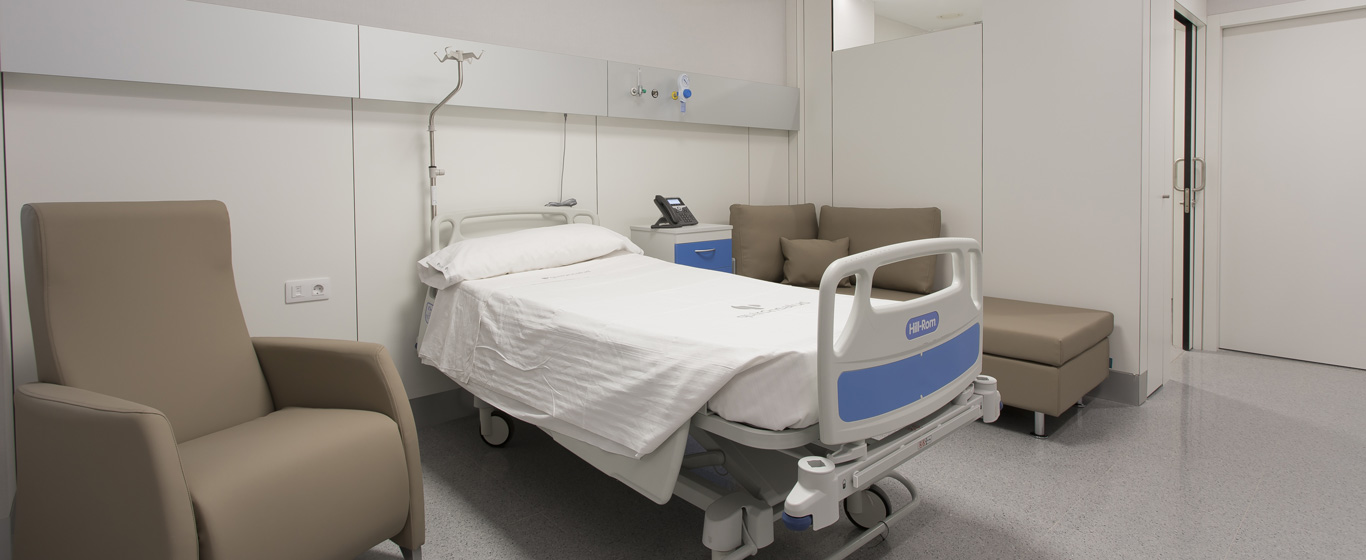Palliative care
We tell you everything you need to know about palliative care. Find out which patients would benefit from this speciality’s team approach, not just patients in the final stages of their lives. Book your palliative care consultation at one of our hospitals.

What is palliative care?
According to the WHO definition, "Palliative Care is a way of improving the quality of life of patients and families facing life-threatening illness, by preventing and relieving suffering through early diagnosis, appropriate assessment and timely treatment of pain and other physical, psychosocial and/or spiritual problems".
We consider palliative care to be an essential component of healthcare based on the concepts of dignity, autonomy and patient rights. It guarantees adequate continuity of care from the identification of symptoms that are difficult to control at the beginning of the diagnosis to end-of-life support, including bereavement support for relatives. It promotes a comprehensive and coordinated response from the healthcare system, adjusted to the needs of each case, and respecting each patient’s autonomy and values. Patient care is personalised, focused and tailored to the patient’s needs, values, wishes and preferences.
Scope of application of palliative care
Made up of nurses, doctors, psychologists, social workers and, on occasions, spiritual care teams, the palliative care team at Quirónsalud works in a multidisciplinary way to offer patients everything they need to feel better and mitigate their suffering, from multiple spheres:
- Symptomatic sphere: drugs are prescribed according to the patient’s symptoms and situation.
- Nutritional sphere: enables the patient to adapt their diet to their condition.
- Emotional sphere: psychological therapy is essential to accept the physical changes and the illness, both for the patient and their loved ones.
- Spiritual sphere: talking to a spiritual care team, at the patient’s request, can improve their adjustment to the new situation and help the practitioner to understand the needs of both the patient and the family.
- Administrative sphere: helping relatives to deal with legal issues arising from the illness, and the death of the patient.
In addition, at Quirónsalud we are committed to promoting social projects, such as family schools to guide and accompany caregivers of patients with palliative needs, and workshops in schools to raise awareness about end-of-life care.
Techniques, procedures and diagnostic methods
The methods and procedures we use in palliative care are the same as in all other specialities. The difference lies in their suitability to the patient’s situation and needs. They range from non-pharmacological to pharmacological therapies. Some of the most frequent are:
- Medication: drugs are prescribed according to the patient’s symptoms and situation.
- Psycho-behavioural approach.
- Physiotherapy: helps reduce certain symptoms and promotes physical activity during the illness.
- Occupational therapy: promotes the patient’s autonomy to the best of their ability in order to improve their self-esteem and reduce the burden on carers.
- Magnetotherapy: treatment using magnetic fields that reduces inflammation, is vasodilatory, regenerates cells, has an anti-inflammatory effect and minimises pain.
- Step four of the analgesic ladder: interventional approach on behalf of the Pain Unit, including nerve blocks, dry needling, electrotherapy, etc.
Diseases and symptoms
Which patients is it for? Main pathologies and diseases
Palliative care covers people with an advanced, incurable and progressive illness, who have no reasonable chance of responding to specific treatment.
This stage of the disease is characterised by the presence of intense, multiple and multifactorial symptoms which change over time, with great emotional impact on patients, their families and therapeutic teams.
Our palliative care teams not only look after cancer patients, but also for patients with organ failure and neurodegenerative diseases, who suffer a slower progressive deterioration, with episodes of acute deterioration associated with crises/hospitalisations with partial recovery.
The list of pathologies requiring follow-up by palliative care teams includes:
- Amyotrophic lateral sclerosis (ALS)
- Cancer
- Cystic fibrosis
- Parkinson’s disease
- AIDS
- Renal failure
- Dementia
- Stroke
- Pulmonary disease
- Heart disease
- Blood disorders
- Liver disease
Related symptoms
Some of the symptoms that palliative care aims to mitigate are:
- Pain
- Nausea and vomiting
- Anxiety
- Nervousness
- Depression
- Sadness
- Constipation
- Difficulty breathing
- Anorexia
- Fatigue
- Sleep disorders
- Loss of appetite
- Deliriums
About the palliative care consultation
We solve any doubts you may have before you see the specialist
Referral to palliative care is determined by the needs identified by your usual specialists, from your general practitioner to your oncologist or internist. Specialists recommend early consultation, as early care provides great benefits both to the patient, covering physical and emotional needs, and to the family, favouring the adjustment process and the bond with the palliative care team. The level of information and details discussed in the consultation will always depend on the patient’s wishes.
What should you keep in mind?
Our palliative care consultation follows a multidimensional approach. We carry out a bio-psychosocial assessment, making a situational diagnosis of the patient (at a cognitive, functional and social level) and address the symptoms that have the greatest impact on the patient’s quality of life and wellbeing. Depending on the level of knowledge of the disease and the patient’s desire to be aware of the situation and prognosis, care planning is tailored to the patient’s needs.
What should I take to the appointment?
In addition to a list of symptoms and medication being taken, the first consultation is the time to share any doubts you may have. In subsequent appointments, you can discuss the progress made and any changes in needs that may have arisen during the time since your previous visit.
You may receive a questionnaire a few days before your appointment asking about your medical history, usual medication and other specific questions that will allow us to anticipate certain aspects of your consultation, helping us to expedite and personalise your care. To do this, we recommend that you download the free Quirónsalud Patient Portal application, which will facilitate communication with your healthcare team.

If you have any further questions, please contact us through the Patient Services telephone number: 900 301 013












